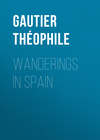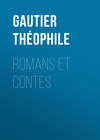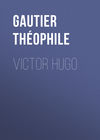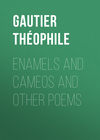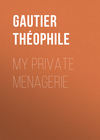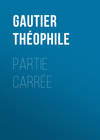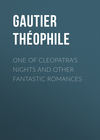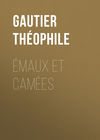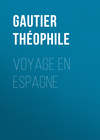Kitabı oku: «Wanderings in Spain», sayfa 22
Moratin, the author of the "Si de las Niñas" and "El Café," whose tombs may be seen in Père la Chaise at Paris, was the last reflection of dramatic art in Spain, just as the old painter Goya, who died at Bordeaux, in 1828, was the last whom we could look on as a descendant of the great Velasquez.
At present, hardly anything else is played in Spanish theatres but translations of French dramas and vaudevilles. At Jaen, in the very heart of Andalusia, they give "Le Sonneur de Saint Paul;" at Cadiz, which is but two steps from Africa, "Le Gamin de Paris." The "Saynetes," which were formerly so gay and so original, and possessing such a strong local tinge, are at present nothing save imitations of the repertory of the Théâtre des Variétés. Not to speak of Don Martinez de la Rosa, and Don Antonio Gil y Zarate, who already belong to a less recent period, the Peninsula can still boast of several young and talented authors of great promise; but public attention in Spain, as in France, is diverted from the stage by the gravity of political events. Hartzembusch, the author of the "Lovers of Ternel;" Castro y Orozco, to whose pen we owe "Fray Luis de Leon, or the Age and the World;" Zorilla, who brought out successfully the drama of "El Rey y el Zapatero;" Breton de los Herreros, the Duke de Rivas, Larra, who committed suicide for love; Espronceda, whose death has just been announced in the papers, and whose writings were characterized by a wild and passionate energy, sometimes worthy of his model, Byron, are – alas! in speaking of the last two we must say, were, men of great literary merit, ingenious, elegant, and easy poets, who might take their places by the side of the old masters, did they not want what we all want, – namely, a sure and certain point to start from, a stock of ideas common both to them and the public. The point of honour and the heroism of the old pieces are either no longer understood or appear ridiculous, and the belief of modern times is not sufficiently definite to enable poets to describe it in their verse.
We must not, therefore, be too severe in judging the crowd, who rush to the bull-ring and seek for emotion where it is to be found; after all, it is not the people's fault that the stage is not more attractive; all the worse for us poets, if we allow ourselves to be beaten by the gladiators. In conclusion, it is more healthy both for the mind and the body to see a brave man kill a savage beast beneath the canopy of heaven, than to listen to an actor without talent singing some obscene vaudeville, or spouting a number of sophisticated lines before a row of smoky footlights.
CHAPTER XII
FROM MALAGA TO SEVILLE
The Four-wheeled Galera – Caratraca – The "Mayoral" – Ecija – The "Calle de los Caballeros" – La Carlotta – Cordova – The Archangel Raphael – The Mosque – Caliph Abderama – The Guadalquiver – Road to Seville.
As yet we were only acquainted with the galera on two wheels; we now had the pleasure of making a trial of one on four. An amiable vehicle of this description happened to be about starting for Cordova; it was already occupied with a Spanish family, and we helped to fill it still more. Just fancy rather a low wagon, with its sides formed of a number of wooden spokes at a considerable distance from each other, and having no bottom save a strip of spartum on which the trunks and packages are heaped, without much attention to the irregularities of surface which they may present. Above the luggage are thrown two or three mattresses, or, to speak more correctly, two or three linen sacks, in which a few tufts of wool but very slightly carded, float about, and on these mattresses the unfortunate travellers are stretched transversely, in a position very similar (excuse the triviality of the comparison) to that of calves that are being carried to market. The only difference is, that the travellers do not have their feet tied, but their situation is not much more comfortable for all that. The top consists of a coarse cloth, stretched on wooden hoops, and the whole machine is driven by a mayoral and dragged by four mules.
Our fellow-travellers consisted of the family of an engineer, who was rather a well educated man, and spoke very good French. They were accompanied by a tall, villanous, fantastic-looking individual, who had formerly been a brigand in Jose Maria's gang, and who was now a superintendent of mines. This gentleman followed the galera on horseback, with a knife stuck in his girdle and a carbine slung at his saddle-bow. The engineer appeared to entertain a high opinion of him, and spoke in very favourable terms of his probity, of which he was perfectly convinced in spite of the superintendent's old trade. It is true that in speaking of Jose Maria himself, he told me several times that he was a brave and worthy man. This opinion, which would strike us as slightly paradoxical in the case of a highway robber, is that of the most honourable persons in Andalusia. On this point, Spain is still Arabian, and brigands very frequently are looked upon as heroes. This is less strange than it may at first appear, especially in southern countries, where men's minds are so easily acted on. Is it not certain that the contempt of death, audacity, coolness, bold and prompt determination, address, and bodily strength, and all the kind of grandeur which belongs to a man who revolts against society, as well as the qualities which exercise so great an influence over minds as yet but little civilized, are exactly those which constitute great characters, and is the people so very wrong in admiring them in these energetic individuals, even although they employ them in a reprehensible manner?
The cross-road along which we were journeying ascended and descended rather abruptly through a country dented with hills and furrowed by narrow valleys, the bottom of which was occupied by the dry beds of torrents, and bristling with enormous stones that jolted us most atrociously, and elicited loud screams from the women and children. On our road we noticed some admirably coloured and poetical effects of sunset. The mountains in the distance assumed a variety of purple and violet hues, tinged with gold, of the most extraordinary warmth and intensity, while the total absence of vegetation imparted to the whole scene, consisting exclusively of ground and sky, a look of grand nudity and savage severity that is to be found in no other country, and which no painter has yet transferred to canvass. We halted for a few hours at nightfall, in a little hamlet of three or four houses, in order to rest our mules and obtain some refreshment: but with the thoughtlessness of true French travellers, although a sojourn of five months in Spain ought to have rendered us more prudent, we had brought nothing with us from Malaga, and the consequence was that we were obliged to sup on dry bread and white wine, which a woman in the posada was obliging enough to procure for us, for Spanish safes and cellars do not participate in that horror which Nature is said to entertain for a vacuum, but contain nothing with the most perfect tranquillity of conscience.
About one o'clock in the morning we set out again; and, in spite of the awful jolting, of the engineer's children rolling over us, and of the knocks that our heads received from bumping against the spokes of the wagon, we soon fell asleep. When the sun came and tickled our noses with one of his rays, as with a golden ear of corn, we were near Caratraca, an insignificant village which is not marked in the map, and which is only remarkable for its sulphurous springs, which are very beneficial in diseases of the skin, and attract to this remote spot a population that is rather suspicious and not calculated to prove very desirable company. Gambling is carried on there to a frightful extent, and although it was still very early, the cards and ounces of gold were passing from hand to hand. It was something hideous to see these invalids with their green, cadaverous faces, rendered still more ugly by rapacity, slowly stretching out their fingers and seizing convulsively their prey. The houses of Caratraca, like those of all Andalusian villages, are whitewashed; and this, in conjunction with the bright colour of the tiles, the festoons of the vines, and the shrubs growing around, gives them a comfortable, holiday look, very different from the picture we are accustomed to draw, in other parts of Europe, of Spanish filth; this notion is generally false, and the fact of its ever having been entertained can only be attributed to some miserable hamlets in Castile, whose wretchedness is equalled and even surpassed by some that we possess in Brittany.
In the courtyard of the inn, our attention was attracted by a number of coarse frescoes, representing, with primitive simplicity, bull-fights: round the pictures were coplas in honour of Paquirro Montes and his quadrille. The name of Montes enjoys the same kind of universal popularity in Andalusia as that of Napoleon does with us; walls, fans, and snuff-boxes are ornamented with his portrait; and the English, who always turn the public taste – whatever it may be – to good account, send from Gibraltar thousands of handkerchiefs with red, violet, and yellow printed portraits of the celebrated matador, accompanied by verses in his praise.
Remembering our famished condition the night before, we purchased some provisions from our host, and among other articles, a ham, for which he made us pay an exorbitant price. A great deal has been said about highway robberies, but it is not on the highway that the danger exists; it is at the road-side, in the inns, that you are robbed and pillaged with the most perfect safety to those that plunder you, without your possessing the right of having recourse to your weapons of defence, and discharging your carbine at the waiter who brings you your bill. I pity the brigands from the bottom of my heart; such landlords as those in Spain do not leave much for them, and only deliver travellers into their hands, like so many lemons with the juice squeezed out. In other countries, landlords make you pay a high price for the things with which they supply you, but in Spain you pay for the absence of everything with its weight in gold.
After we had taken our siesta, the mules were put to the galera, each person resumed his place, the escopetero bestrode his little mountain-steed, the mayoral laid in a stock of small flint-stones to hurl at the ears of his mules, and we set out once more on our journey. The country through which we passed was savage without being picturesque. We beheld nothing but bare, naked, sterile, rugged hills, stony torrent-beds, like scars made in the ground by the winter's rains, and woods of olive-trees, whose pale foliage, powdered over with dust, did not suggest the least idea of refreshing verdure. Here and there, on the gaping sides of the rocks of turf and chalk, was a solitary tuft of fennel, whitened by the heat; on the powdery road were the marks of serpents and vipers, while, over the whole, was a sky as glowing as the roof of an oven and not a gust of wind, not even so much as the slightest breath of air! The grey sand which was raised by the hoofs of the mules fell again without the least eddy to the ground. You might have made iron red-hot in the sun, which darted its rays on the cloth covering of our galera, in which we were ripening like melons under a glass frame. From time to time, we got out and walked a short distance, keeping in the shade projected by the body of the horse or the wagon; when we had stretched our legs somewhat, we would scramble in again, slightly crushing the children and their mother, for we could not reach our seats except by crawling on all fours under the elliptical arch formed by the tilted roof of the galera. By dint of crossing quagmires and ravines, and making short cuts over fields, we lost our way. Our mayoral, in the hope of coming into the right road again, still went on, as if he was perfectly aware where he was going, for corsarios and guides will never own that they have lost themselves till they are reduced to extremities, and have taken you five or six leagues out of the right direction. I must, in justice, say, however, that nothing could be easier than to lose oneself on this fabulous road, which was scarcely marked out, and intersected every moment by deep ravines. At length we found ourselves in the midst of large fields, dotted here and there by olive-trees, with misshapen, dwarfish trunks, and frightful forms, without the slightest signs of a human habitation or a living being. Since the morning, we had met only one half-naked muchacho driving before him, in a cloud of dust, half-a-dozen black pigs. Night set in, and, to augment our misfortunes, there was no moon, so that we had nothing but the uncertain light of the stars to guide us.
The mayoral left his seat every instant to feel the ground with his hands, in the hopes of finding some rut or wheelmark which might direct him to the right road, but all his efforts were in vain, and, greatly against his inclination, he was under the necessity of informing us that he had lost his way, and did not know where he was: he could not understand it; he had made the journey twenty times, and would have undertaken to go to Cordova with his eyes shut. All this appeared rather suspicious, and the idea then struck us that we were, perhaps, purposely brought there in order to be attacked and plundered. Our situation was not an agreeable one, even supposing this were not the case; we were benighted in a remote spot, far from all human help, in a country which enjoys the reputation of concealing more robbers than all the other provinces of Spain united. These reflections doubtlessly suggested themselves also to the minds of the engineer and his friend, the former associate of Jose Maria, who, of course, was not a bad judge in such matters, for they silently loaded their own carbines with ball, and performed the same operation on two others that were placed inside the galera; they then handed us one apiece without uttering a syllable, a mode of proceeding that was exceedingly eloquent. The mayoral was thus left without arms, and, even had he been in collusion with the brigands, was reduced to a state of helplessness. However, after wandering about at hazard, during two or three hours, we perceived a light glittering like a glow-worm under the branches, at a long distance from us. We immediately adopted it as our polar star, and started off towards it in as direct a line as possible, at the risk of being overturned every moment. Sometimes a rise in the ground would conceal it from our eyes, and all nature seemed to be extinguished. Suddenly it would again appear, and our hopes returned with it. At last we arrived sufficiently near a farm-house to distinguish the windows, which was the sky in which our star was shining under the form of a copper lamp. A number of the peculiar wagons drawn by oxen, and of agricultural instruments, scattered here and there, completely restored our confidence, for we were not, at first, sure that we had not fallen into some den of thieves, some posada de barrateros. The dogs, having smelt us out, began barking furiously, so that the whole farm was soon in a state of commotion. The peasants came out with their muskets in their hands to discover the cause of this nocturnal alarm, and having satisfied themselves that we were honest travellers who had lost our way, politely invited us to enter and rest ourselves in the farm.
The worthy people were just going to sup. A wrinkled, bronzed, and, so to speak, mummified old woman, whose skin formed, at all her joints, large folds like a Hessian boot, was preparing a gigantic gaspacho in a red earthen pan. Five or six magnificent greyhounds, with thin backs, broad chests, and splendid ears, and who were worthy of being in the kennel of a king, followed the old woman's movements with unflagging attention, and the most melancholy look of admiration that can possibly be conceived. But this delicious repast was not intended for them; in Andalusia it is the men, and not the dogs, who eat soup made of bread-crusts steeped in water. Some cats, whom the absence of ears and tails – for in Spain these ornamental superfluities are always cut off – cause to resemble Japanese monsters – were also watching these savoury preparations, only at a greater distance. A plateful of the said gaspacho, two slices of our own ham, and a few bunches of grapes, of the colour of amber, composed our supper, which we were obliged to defend from the greyhounds, who were encroachingly familiar, and, under pretence of licking us, literally tore the meat out of our mouths. We rose from our seats, and eat standing up, with our plates in our hands, but the diabolical brutes got on their hind legs, and, throwing their fore-paws over our shoulders, were thus on a level with the coveted food. Even if they did not actually carry it off, they at least gave it two or three licks with their tongues, and thus contrived to obtain the first taste of its flavour. It appeared to us that these greyhounds must have been descended in a right line from the famous dog, whose history Cervantes, however, has not written in his Dialogues. This illustrious animal held the office of dish-washer in a Spanish fonda, and when the girl was blamed because the plates were not clean, she swore by everything she held holy, that they had been washed in six waters por siete Aguas. Siete Aguas was the name of the dog, who was so called because he licked the plates so scrupulously clean, that any one would have supposed that they had been washed in six different waters; on the day in question he must have performed his work in a slovenly manner. The greyhounds of the farm certainly belonged to the same breed.
Our hosts gave us a young boy as guide, who was well acquainted with the road, and who took us safely to Ecija, which we reached about ten o'clock in the morning.
The entrance to Ecija is rather picturesque. You pass over a bridge, at the end of which is a gateway like a triumphal arch. This bridge is thrown over a river, which is no other than the Genil of Granada, and which is obstructed by ancient arches and milldams. When you have passed the bridge, you find yourself in an open square, planted with trees, and ornamented with two rather strange monuments. The first is a gilt statue of the Holy Virgin, placed upon a column, the pedestal of which evidently forms a kind of chapel, decorated with pots of artificial flowers, votive offerings, crowns formed of the pith of rushes, and all the other gewgaws of Meridional devotion. The second is a gigantic Saint Christopher, also of gilt metal, with his hand resting upon a palm-tree, a sort of walking-stick in keeping with his immense size; on his shoulder he bears, with the most prodigious contraction of all his muscles, and with as great an effort as if he were raising a house, an exceedingly small infant Jesus, of the most delicate and charming style. This colossus, said to be the work of the Florentine sculptor, Torregiano, who flattened, with a blow of his fist, Michael Angelo's nose, is stuck upon a Solomonic column (as wreathed columns are here called) of light, rose-coloured granite, the spiral wreaths of which end half-way up in a mass of volutes and extravagant flower-work. I am very partial to statues placed in this position; they produce a greater effect, and are seen advantageously at a longer distance. The ordinary pedestals have a kind of flat, massive look, which takes away from the lightness of the figures which they support.
Although Ecija lies out of the ordinary route of tourists, and is generally but little known, it is a very interesting town, and very original and peculiar in its appearance. The spires which form the sharper angles in its outline are neither Byzantine, nor Gothic, nor in the Renaissance style; they are Chinese, or rather Japanese, and you might easily mistake them for the turrets of some miao dedicated to Kong-fu-Tzee, Buddha, or Fo; for the walls are entirely covered with porcelain tiles of the most vivid tints, while the roofs are formed of varnished white and green tiles, arranged like the squares of a chessboard, and presenting one of the most curious sights in the world. The rest of the buildings are not less chimerical. The love of distorted lines is carried to the utmost possible lengths. You see nothing but gilding, incrustation, breccia, and various-coloured marbles, rumpled about as if they were cloth and not stone, garlands of flowers, lovers'-knots, and bloated angels, all coloured and painted in the most profuse manner and sublime bad taste.
The Calle de los Caballeros, where the nobility reside and the finest mansions are situated, is truly a miraculous specimen of this style: you have some difficulty in believing that you are in a real street, between houses that are inhabited by ordinary human beings. Nothing is straight, neither the balconies, the railings, nor the friezes; everything is twisted and tortured all sorts of ways, and ornamented with a profusion of flowers and volutes. You could not find a single square inch which is not guilloched, festooned, gilt, carved, or painted; the whole place is a most harsh and extravagant specimen of the style termed in France rococo, and presents a crowding together of ornament that French good taste, even during its most depraved epochs, has always successfully avoided. This Pompadour-Dutch-Chinese style of architecture amuses and surprises you in Andalusia. The common houses are whitewashed, and their dazzling walls stand out wonderfully from the deep azure of the sky, while their flat roofs, little windows, and miradores, reminded us of Africa, which was already sufficiently suggested to our minds by thirty-seven degrees of Réaumur, which is the customary temperature of the place during a cool summer. Ecija is called the Stove of Andalusia, and never was a surname more richly merited. The town is situated in a basin, and surrounded by sandy hills which shield it from the wind, and reflect the sun's rays like so many concentric mirrors. Every one in the place is absolutely fried, but this did not prevent us from walking about all over it while our breakfast was being prepared. The Plaza Mayor has a very original look, with its pillared houses, its long rows of windows, its arcades, and its projecting balconies.
Our parador was tolerably comfortable; they gave us a meal that was almost human, and we partook of it with a degree of sensuality very allowable after so many privations. A long siesta, in a large room, carefully shut up, very dark, and well watered, completely restored us; and when, about three o'clock, we again got into the galera, it was with a quiet air of perfect resignation that we did so.
The road from Ecija to La Carlotta, where we were to pass the night, traverses a very uninteresting country, which appeared to be arid and dusty, or at least the season gave it that look; it has not left any very remarkable impression on my mind. A few olive plantations and clumps of oak-trees appeared from time to time, and the aloes displayed their bluish foliage which is always so characteristic. The dog belonging to the superintendent of mines (for, besides the children, we had some quadrupeds in our menagerie) started a few partridges, two or three of which were brought down by my companion. This was the most remarkable event during this stage.
La Carlotta, where we stopped for the night, is an unimportant hamlet. The inn is an ancient convent, which had first been turned into barracks, as is almost always the case in times of revolution, military men feeling at their ease, and installing themselves in buildings arranged for monastic life more easily than any other class of persons. Long-arched cloisters formed a covered gallery all round the four sides of the courtyard. In the middle of one of the sides yawned the black mouth of an enormous and very deep well, which promised the luxury of some very cold and very clear water. On leaning over the edge, I saw that the interior was completely lined with plants of the most beautiful green, that had sprung up between the stones; and, indeed, to find any kind of verdure or coolness, it was necessary to go and look into the wells, for the heat was so great, that any one might have supposed it was caused by a large fire in the immediate neighbourhood. The only thing that can give the least idea of it is the temperature of those hot-houses where tropical plants are reared. Even the air burnt you, and ignited molecules seemed to be borne along in each gust of wind. I endeavoured to go out and take a turn in the village, but the stove-like vapour which greeted me the moment I had crossed the threshold, caused me to turn back. Our supper consisted of fowls cut to pieces and laid pell-mell on a bed of rice, as highly flavoured with saffron as a Turkish pillau, with the addition of a salad (ensalada) of green leaves in a deluge of vinegar and water, dotted here and there with drops of oil, taken, doubtless, from the lamp. After we had finished this sumptuous repast, we were conducted to our rooms, which were, however, already so full, that we sallied out to pass the rest of the night in the middle of the courtyard, with our mattress wrapped round, and a chair turned upside down instead of a pillow. There, at least, we were only exposed to the mosquitos; by putting on our gloves, and covering our faces with our handkerchiefs, we escaped with merely five or six stings, which were simply painful, but not disgusting.
The people of the inn had a slightly hang-dog look, but this was a circumstance about which we had long since ceased to concern ourselves, accustomed as we were to meet with faces more or less repulsive. A fragment of their conversation which we overheard proved that their sentiments corresponded to their faces. Thinking that we did not understand Spanish, they asked the escopetero whether they could not do a little stroke of business by lying in wait for us a few leagues further on. Jose Maria's old associate replied, with most perfect nobleness and majesty, "I shall suffer nothing of the kind, as these two young gentlemen form part of the company in which I myself am travelling. Besides, they expect to be robbed, and have only as much as is strictly necessary for the journey, the rest of their money being in bills of exchange on Seville. Again, they are both strong tall men; as for the engineer, he is my friend, and we have four carbines in the galera." This persuasive mode of argument produced its effect on our host and his acolytes, who, on this occasion, contented themselves with the ordinary method of plundering that the innkeepers of all countries are permitted to practise.
In spite of all the frightful stories about brigands which are related by travellers and the natives themselves, this was our only adventure, and the most dramatic incident during our long peregrinations through the provinces which are accounted the most dangerous in all Spain, and at a time that was certainly favourable for this kind of meeting: the Spanish brigand was for us a purely chimerical being, an abstraction, a poetic fiction. We never once perceived the least sign of a trabuco, and we became, as far as robbers were concerned, as incredulous as the English gentleman mentioned by Mérimée, and who, having fallen into the hands of a band of brigands who plundered him, would insist that they were only theatrical supernumeraries dressed up and posted there to play him a trick.
We left La Carlotta about three o'clock in the afternoon, and halted, in the evening, at a miserable gipsy's hut, the roof of which was formed of simple branches cut off the trees, and thrown, like a kind of coarse thatch, over cross pieces. After drinking a few glasses of water, I quietly stretched myself out before the door, upon the bosom of our common mother, and began watching the azure immensity of heaven, where the large stars seemed to float like swarms of golden bees, while their twinkling formed a kind of luminous haze, similar to that which a dragon fly's invisible wings produce round his body by the immense rapidity with which they move; but it was not long before I fell into a profound sleep, just as if I had been reposing on the softest bed in the world. I had, however, for a pillow nothing but a stone wrapt up in the cape of my cloak, while some very respectable flints were stamping an impression of themselves in the hollow of my back. Never did a more beautiful and milder night envelope the globe in her mantle of blue velvet. At about midnight, the galera set out once more, and, when morning appeared, we were not more than half a league from Cordova.
It might, perhaps, be supposed from my description of all these halts and marches, that Cordova is separated by a great distance from Malaga, and that we had gone over an enormous deal of ground in the course of our journey, which did not occupy less than four days and a half. The distance we went, however, is only twenty Spanish leagues, that is to say, about thirty French ones, but the vehicle was heavily loaded, the road abominable, and no fresh mules waiting for us at regular distances. Besides, the heat was so intolerable that it would have suffocated both man and beast, had we ventured out during the time that the sun was at its height. This journey, however, slow and wearisome as it was, has left a pleasing impression on my mind: excessive rapidity in the means of transport, deprives the road of all charm; you are hurried along like a whirlwind, without having time to see anything. If a man comes to his journey's end directly, he may as well stop at home. For my part I think that the pleasure of travelling consists in travelling, and not in arriving at your destination.
